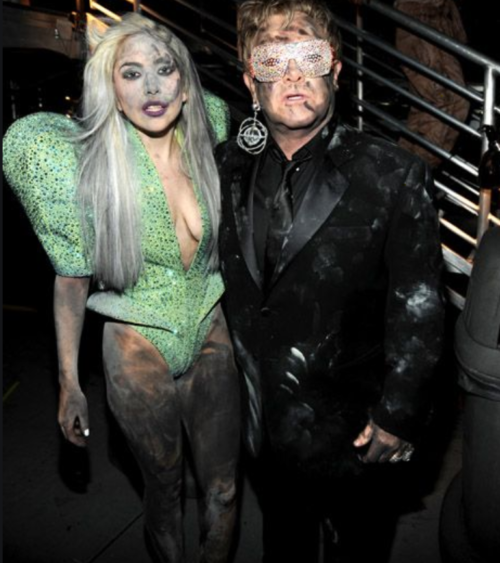Because Netflix’s recent Eurovision Song Contest: The Story of Fire Saga has gotten many thinking about the sonic and aesthetic themes of the long-running competition, it bears noting that several tracks on Lady Gaga’s Chromatica feel tailor-made for the beloved contest. From “Plastic Doll” to “1000 Doves,” Gaga undeniably returned to the Eurocentric sound that was more noticeable on her debut, The Fame. The most shining example of that is her collaboration with Europe’s own (well, formerly, anyway–before Brexit–though it’s long been clear England thinks of itself as its own continent) Elton John, entitled “Sine From Above.”
Produced by a bevy of mononym geniuses including BloodPop®, Burns, Axwell, Liohn and Klahr, the sound is distinctly, shall we say, not fit for the U.S. And if you couldn’t guess, the majority of these men are Swedish, where all of the best pop meets Euro dance music is still forged (hence, ABBA winning Eurovision in ‘74), with BloodPop® being the sole American (and Burns being the Brit… probably by virtue of Elton wanting some nationalistic flavor on it). Still, he pulls his weight–just not enough to make cheesiness work the way Europeans can, hence calling them in for reinforcement. For the entire message of the song speaks to the healing properties of music, referring to it in a technical form with the word “sine” (though of course, it’s also a play on the word “sign”–as in taking one from God, connoting the religiosity of both Gaga and John’s relationship with la musique).
Speaking to the ways in which all of one’s problems can drift away when she takes on the dance floor (as Gaga and John’s nemesis once said, “I know a place where you can get away/It’s called a dance floor”–in addition to, “Music makes the people come together”), the two sing in reverent unison to the salvation of the beat, “I lived my days just for the nights/I lost myself under the lights/When I was young, I felt immortal.” In point of fact, the lamenting quality of the song seems to ruminate on how much freer, uninhibited one feels in their youth, despite the oppressive sentiment of being at the foolish mercy of others’ opinions. Yet, at the same, time no matter how old you are, music can always transport you to a higher plane, in addition to taking you back in time to a specific moment when you either first heard the song or it was being listened to on repeat during a particular period/season (associations of this nature so often tend to intermingle with summer).
With a rhythmic backbeat that recalls something from an Ibiza foam party, there is a free-spirited aura to the track that speaks to the liberation both musicians feel whenever they let the melody take hold, losing themselves in it to forget or overcome whatever trauma they’ve either been through or are enduring at the moment. Bemoaning with a touch of atheism at first, “Yeah, I looked with my face up to the sky/But I saw nothing there, no, no, nothing there/Yeah, I stared while my eyes filled up with tears/But there was nothing there, no, no nothing,” the two speak of an instant when they first unearthed there was a “sine from above” that could help them, and it had nothing to do with God in the Catholic sense. For if religion has taught us anything throughout history, it’s that believing in the power of an intangible entity is best attributed to a concept rather than an invisible, wrathful being.
So it is that they find their release–their god–in the music, and, in turn, instill that same feeling within us as we listen in enraptured awe. If that’s not the essence of a Eurovision song–complete with a uniting message–one surely doesn’t know what is.





















